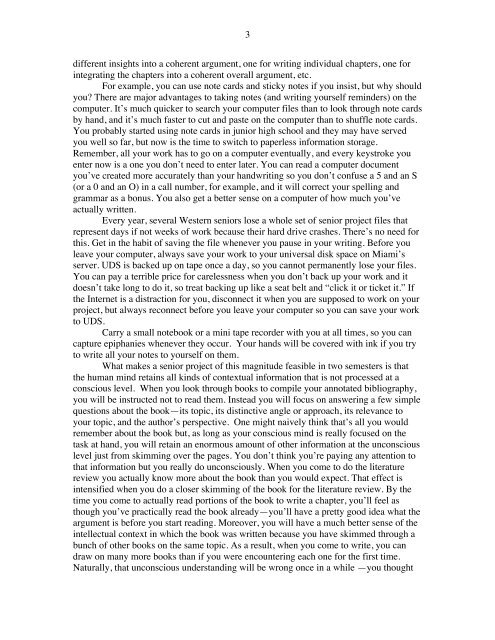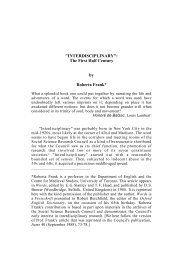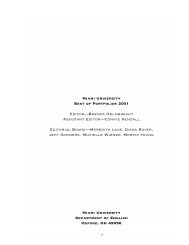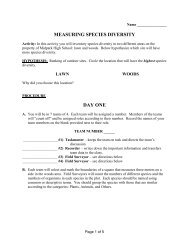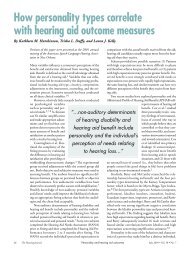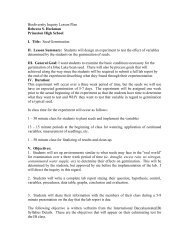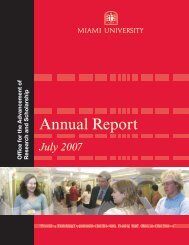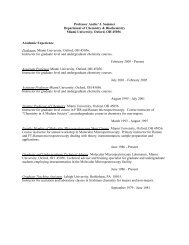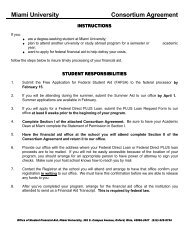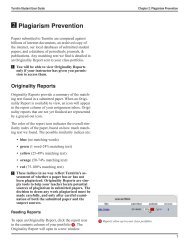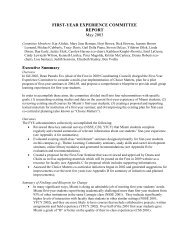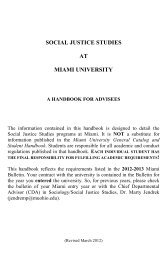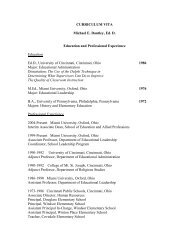Interdisciplinary Research Manual - Units.muohio.edu
Interdisciplinary Research Manual - Units.muohio.edu
Interdisciplinary Research Manual - Units.muohio.edu
You also want an ePaper? Increase the reach of your titles
YUMPU automatically turns print PDFs into web optimized ePapers that Google loves.
3<br />
different insights into a coherent argument, one for writing individual chapters, one for<br />
integrating the chapters into a coherent overall argument, etc.<br />
For example, you can use note cards and sticky notes if you insist, but why should<br />
you? There are major advantages to taking notes (and writing yourself reminders) on the<br />
computer. It’s much quicker to search your computer files than to look through note cards<br />
by hand, and it’s much faster to cut and paste on the computer than to shuffle note cards.<br />
You probably started using note cards in junior high school and they may have served<br />
you well so far, but now is the time to switch to paperless information storage.<br />
Remember, all your work has to go on a computer eventually, and every keystroke you<br />
enter now is a one you don’t need to enter later. You can read a computer document<br />
you’ve created more accurately than your handwriting so you don’t confuse a 5 and an S<br />
(or a 0 and an O) in a call number, for example, and it will correct your spelling and<br />
grammar as a bonus. You also get a better sense on a computer of how much you’ve<br />
actually written.<br />
Every year, several Western seniors lose a whole set of senior project files that<br />
represent days if not weeks of work because their hard drive crashes. There’s no need for<br />
this. Get in the habit of saving the file whenever you pause in your writing. Before you<br />
leave your computer, always save your work to your universal disk space on Miami’s<br />
server. UDS is backed up on tape once a day, so you cannot permanently lose your files.<br />
You can pay a terrible price for carelessness when you don’t back up your work and it<br />
doesn’t take long to do it, so treat backing up like a seat belt and “click it or ticket it.” If<br />
the Internet is a distraction for you, disconnect it when you are supposed to work on your<br />
project, but always reconnect before you leave your computer so you can save your work<br />
to UDS.<br />
Carry a small notebook or a mini tape recorder with you at all times, so you can<br />
capture epiphanies whenever they occur. Your hands will be covered with ink if you try<br />
to write all your notes to yourself on them.<br />
What makes a senior project of this magnitude feasible in two semesters is that<br />
the human mind retains all kinds of contextual information that is not processed at a<br />
conscious level. When you look through books to compile your annotated bibliography,<br />
you will be instructed not to read them. Instead you will focus on answering a few simple<br />
questions about the book—its topic, its distinctive angle or approach, its relevance to<br />
your topic, and the author’s perspective. One might naively think that’s all you would<br />
remember about the book but, as long as your conscious mind is really focused on the<br />
task at hand, you will retain an enormous amount of other information at the unconscious<br />
level just from skimming over the pages. You don’t think you’re paying any attention to<br />
that information but you really do unconsciously. When you come to do the literature<br />
review you actually know more about the book than you would expect. That effect is<br />
intensified when you do a closer skimming of the book for the literature review. By the<br />
time you come to actually read portions of the book to write a chapter, you’ll feel as<br />
though you’ve practically read the book already—you’ll have a pretty good idea what the<br />
argument is before you start reading. Moreover, you will have a much better sense of the<br />
intellectual context in which the book was written because you have skimmed through a<br />
bunch of other books on the same topic. As a result, when you come to write, you can<br />
draw on many more books than if you were encountering each one for the first time.<br />
Naturally, that unconscious understanding will be wrong once in a while —you thought


